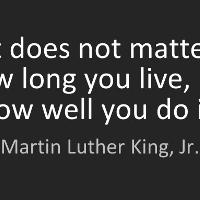"It does not matter how long you live, but how well you do it ." - Martin Luther King
While this quote from Martin Luther King is a noble and emotive one, it does still beg the question: How do we define a life well-lived?
Demographers (and others) are often concerned with life expectancies, which are usually calculated on the basis of current levels of age-specific mortality, and provide us with the a translation of these age-specific death rates into expected number of years left to live at a particular age – most often at birth. These calculated life expectancies are at the population level and differ significantly according to where an individual lives, their socio-economic standing, and how well they live their lives. Here we understand well as defining a healthy life style of moderation and variation, as my father used to say.
In the course of the last week, I have spoken at two events in London, one organised by Newton Investment Management and one by The Economist. In both cases, these events addressed ageing societies and the challenges they pose to individuals, families, communities and governments. A key issue in both events was how long we can expect to live and how well we can expect to live? Will we live longer active lives? Or will we live longer but frailer lives?
And this should be an issue that concerns each and every one of us.
Recent work I have published[1] suggests that the 21st century is destined to be the century of centenarians with the number of people in England and Wales aged at least 100 years likely to increase from around 15,000 to at least 300,000 by 2050 and this is a trend repeated around the globe. So as a population we are ageing and we are living (a lot) longer, but sadly this does not apply to us all.
If we look at life expectancies at any age, we find inequalities in death everywhere, between countries, between regions within countries, between different socio-economic groups within a region. For example, mortality rates in Glasgow are the highest in the United Kingdom, and life expectancy at birth is 71.6 years for men, nearly seven years below the national figure of 78.2 years, and 78 years for women, over four years below the national figure of 82.3. According to the World Health Organization in 2008, life expectancy at birth for men in the Calton area of Glasgow was just 54 years, on a par with that of men in Burundi according to data from the United Nations[2].
What really are the drivers of these inequalities in death? One of the most cited pieces of research in this field dates back to the 1980s[3]. In this classic study of more than 17,000 male Whitehall civil servants, mortality in the group was observed and recorded over a period of 10 years. Marmont and colleagues found a dramatic inverse relation between grade and mortality among these civil servants, so that when compared with those in highest grade, men in the lowest grade had three times the mortality rate from coronary heart disease, for example, and from all causes combined. Smoking was identified as a contributor to this mortality differential, but other factors are clearly at play. It was originally thought that social class differentials in mortality were to be understood mainly in terms of poverty measures such as inadequate nutrition, overcrowded living conditions, poor sanitation and personal hygiene, and hazardous working conditions. However, it is now evident that despite the considerable improvements in the standard of living of the lower socio-economic groups, there is still a large gap in life expectancy and larger (increasing) gaps in healthy life expectancy, so there is a clear social gradient in mortality risk with lower income groups having higher mortality rates despite being well above the poverty line.
More than 30 years on from those Whitehall studies, there is now an enormous amount of evidence from several decades of UK studies to show that mortality risk in the adult population is strongly associated with measures of individual socioeconomic status (SES) such as income, occupational status, or education[4].
And these differences persist in later life. At a recent lecture at St. Cross College, Oxford, Professor Sarah Harper cited results from the same body of work carried out by Howse & Madrigal (op.cit) indicating that life expectancy for men aged 65 years varies from 12 to 23 years dependent on income, health and lifestyle.
But back to Glasgow, or rather Manchester.
While mortality nationally in England and Wales is declining, Manchester would seem to be our Glasgow. Recent data from the Office for National Statistics indicates that Manchester has the highest death rate in England and Wales, with mortality rates 32 per cent above the national level. This doubtless reflects the same old story of Marmont, Howse and Harper cited above, namely differences in income deprivation, socio-economic status and health behaviour.
We all know that smoking, inactivity and unhealthy diets are not good for us. So why do so many of us persist in behaving so badly? Perhaps the key lies in income deprivation and all that that brings with it. In that situation, seemingly hopeless and endless, an individual feels out of control, and we know that control is hugely important for our overall well-being[5]. And when we feel that we are not in control of our lives, then where is the incentive to improve our behaviours which will ultimately end our lives unnecessarily early?
For those of us in this situation, the words of Martin Luther King have a sinister ring. We are living neither long nor well…..and it seems to be out of our control.
[1] The impact of mortality development on the number of centenarians in England and Wales, Journal of Population Research, Springer, 23 September 2016, pp. 1-15, DOI 10.1007/s12546-016-9178-8.
[2] World Population Prospects: 2015 Revision, United Nations, Department of Economic and Social Affairs, New York.
[3] Marmont, M., Shipley, M.J. & Rose, G. (1984) Inequalities in death – specific explanations of a general pattern? Lancet, 1, pp. 1003-6.
[4] Marmot, M. (2010). Fair society, healthy lives. Strategic review of health inequalities in England post-2010. London: Department of Health.
[5] Leeson, G.W. & Harper, S. (2007) The Global Ageing Survey (GLAS) - Ageing and later life, United Kingdom and Europe, Research report 107, Oxford Institute of Ageing, University of Oxford.
About the Author
Dr. George W. Leeson is Co-Director of the Oxford Institute of Population Ageing, University of Oxford.
Comments Welcome:
We welcome your comments on this or any of the Institute's blog posts. Please feel free to email comments to be posted on your behalf to administrator@ageing.ox.ac.uk or use the Disqus facility linked below.
Opinions of the blogger is their own and not endorsed by the Institute
Comments Welcome: We welcome your comments on this or any of the Institute's blog posts. Please feel free to email comments to be posted on your behalf to administrator@ageing.ox.ac.uk or use the Disqus facility linked below.













